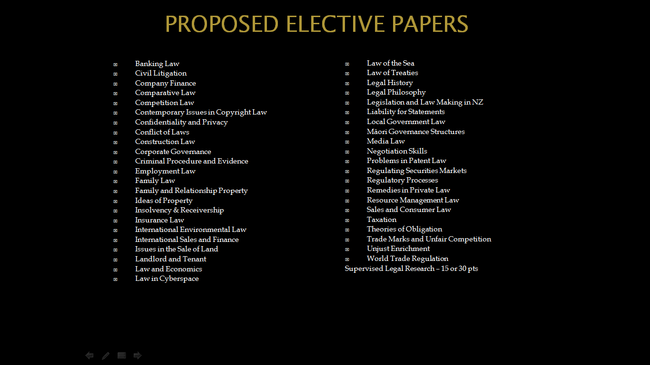Albany Senior High School/A career in law
Contents
- 1 What is a career in law like?
- 1.1 What are the different types of law that you can specialize in?
- 1.2 What does a lawyer do on a day to day basis?
- 1.3
- 1.4 What are some benefits of becoming a lawyer?
- 1.5
- 1.6 What are the differences of a solicitor, corporate/government lawyer and a barrister?
- 1.7
- 1.8 What is required of someone who wants to become a lawyer?
- 1.9 Additional information I found during my project:
What is a career in law like?
This is my impact project for semester one 2011.
I will be exploring what a career in law involves and answering questions that students often have about a career in law.
What are the different types of law that you can specialize in?
There are many different types of law you can specialise in. The different elective papers that you can take at AUT university when studying law, to help you with the area of law that you want to specialise in are shown below.
Some law firms also specialise in a particular area of law. An example of this is at Bell Gully, which specilize in commercial law, this law firm therefore specialises in the sub areas of corporate, business and finance, property and litigation.
Other areas of law that you may choose to specilize in are criminal, enviromental, fraud, unemployment, taxation, youth, family, real estate as well as many, many others.
What does a lawyer do on a day to day basis?
This depends whether you are a solicitor, barrister or corporate/government lawyer and which type of law you specialise in.
Lawyers give advice to clients and represent clients in court.
They also do alot of research on laws and different cases to aid them in helping clients whether it be in meetings or at court.
What are some benefits of becoming a lawyer?
Some benefits of studying law is that it is a 'generic' degree. This means that it can be helpful to lots of different careers. Students who study law also have the highest employability rate, and the majority either have a job or are studying something else within six months of completing their law degree.
Studying law can have many benefits both for the career and for life situations. It allows you to develop communication skills, independent thinking and problem solving skills.
Each case is also different so there is a wide range of variety in the work even though you may specilize in a specific type of law.
Lawyers are also quite well paid and you can improve through the ranks of law so you can always push yourself to aim higher.
What are the differences of a solicitor, corporate/government lawyer and a barrister?
A solicitor carries out legal work on behalf of clients. This includes giving legal advice and studies legal documents.
A corporate/government lawyer carries out and manages legal work for a business or government.
A barrister sole can work on their own account. They give legal advice and appear on behalf of others in court. This is the main difference of a barrister, that they can represent others in court. In order to become a barrister you need to complete a Professionals outside of university which takes around 18 weeks to complete.
What is required of someone who wants to become a lawyer?
This varies depending on if your a solicitor, barrister or corporate/government lawyer, but all lawyers need to be able to consider situations from different peoples point of view.
The individual should have research, organization, negotiation and problem solving skills and also enjoy reading and writing.
Students at high school doing NCEA should have 60 credits across four papers and at least 18 credits at merit or excellence.
There are a number of different universities in New Zealand that offer law as a degree. These universities include AUT, Auckland University, Otago University, University of Canterbury and the University of Waikato. As part of this impact project I visited AUT university and interviewed Mike French the director of undergraduate studies and also had the opportunity to attend a lecture which focused on law in New Zealand after 1840. Through these opportunities I gained knowledge about the new law degree at AUT university. If this interests you I would advise you to take a look at this interview that I conducted http://myportfolio.school.nz/view/view.php?t=2EUyeQG5D9cuW0RbaVfo
Additional information I found during my project:
Students at school should take literacy rich subjects such as english, history, art history and classical studies, you should be able to find university approved subjects for your degree on most university websites.
It usually takes 4 years to complete a law degree at university, although many students choose to do a double degree which will take longer.
Special thanks to:

